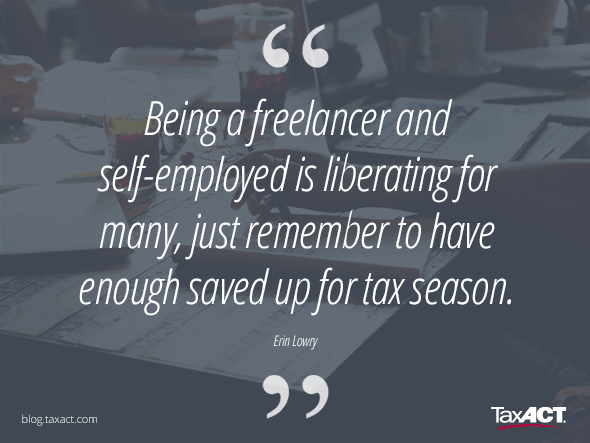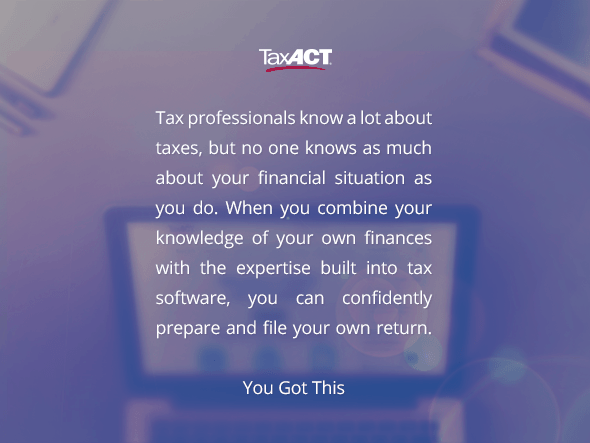7 Tax Tips for the Freelance Economy


File your business taxes with confidence.
Backed by our $100k accuracy guarantee.
Tax season feels eons away for many gainfully employed workers.
Why bother thinking about W-9s that will come in January when Halloween, Thanksgiving, and Christmas are all arriving before tax forms.
Not to mention New Years’, Valentine’s Day, and St. Patrick’s Day all happen before taxes are even due.
But for some workers, tax season is marked by three-month periods, not April 15.

Tax Payments: Quarterly vs Annually
“I do pay quarterly,” says Kali Hawlk, a freelance content marketing manager. Hawlk also pays estimated taxes via IRS Form 1040.
Freelancers, an ever-growing portion of the workforce, get the distinct pleasure of being their own bosses, but in turn have to take on far more financial responsibility. If you have just started
And with that responsibility comes a duty to pay the government its cut – often higher than those of company employed individuals.
“As someone who’s self-employed, you no longer have anyone who takes care of your tax withholdings for you,” explains Hawlk. “You have to account for federal and state taxes, along with the employee and employer halves of Social Security and Medicare taxes. It’s a lot more responsibility to keep up with what you owe when you’re self-employed.”
While she loves being her own boss, Hawlk admitted a common frustration of being self-employed is the need to earn more than when she was an employee.
According to Hawlk, freelancers need to earn 25% more than their gross income as employees in order to account for extra taxes and expenses such as health insurance.
Don’t let the feeling of a windfall deceive you
Independent contractors and self-employed business owners fill out tax forms required by their clients, but often those clients don’t withhold any taxes from a paycheck.
“It’s sometimes nice to get that fat paycheck until you realize how much of it goes to Uncle Sam,” explains Tonya Stumphauzer, founder of Budget and the Beach.
Remember, a large portion of that freelance income needs to be set aside for taxes so you aren’t in the lurch when quarterly estimated taxes are due.
How do you stay organized?
Freelancers need to have impeccable organizational skills – at least when it comes to bookkeeping. It’s important to keep track of all receipts, invoices, tax forms and expenses to maximize tax deductions and minimize tax liability.
“I use Nutcache accounting software to create and track expenses,” says Hawlk. “It’s a very simple but free accounting system. You can make nice, professional-looking invoices and quickly see what’s paid and what’s pending.”
Hawlk prefers to track her gross earnings, expenses, net income, and retirement contributions in a more old fashion way – an Excel spreadsheet.
Stumphauzer uses another software but also prefers to keep it simple.
“I use Freshbooks for invoicing,” says Stumphauzer. “But as far as expenses I rely on my bank statements and credit card statements mostly, as well as saving all my receipts in a special folder throughout the year. After six years as a freelancer, you’d think I’d have some fancy software, but I don’t.”
Some may hire an accountant, but you don’t have to
Freelancers have a lot of paperwork to keep track of, including Form ES-1040 for paying estimated taxes on a quarterly basis, 1099s, and W-9s from clients. Some freelancers prefer to hire an accountant or tax professional, but the move isn’t necessary.
In fact, TaxAct offers tax preparation and tax filing solutions for the self-employed. Both the Free Federal Edition and Deluxe software include Form 1040 with Schedules C and SE.
It’s a simple interview that asks straight-forward questions about income, losses, expenses, deductions, and credits where TaxAct then automatically calculates and enters the data into the appropriate tax forms.

How can freelancers save for retirement and get a tax benefit?
Full-time employees often get the benefit of an employer-matched 401(k) or similar retirement fund. While there isn’t an employer match, Hawlk is always sure to always participate in one big tax-advantage for freelancers.
“Anyone who’s made self-employment income, whether or not you’re full-time or just do work on the side – should open a SEP IRA,” she emphasizes. “Your contributions to this retirement account can be hugely helpful in easing your current tax burden from year to year. Plus, you’ll be socking away money for your future. Win-win!”
I work full-time and plan to start freelancing. Do I still have to pay quarterly taxes?
Just because you have a steady 9-to-5 doesn’t mean your freelance income and expenses isn’t subjectable to quarterly taxes.
Freelancers Union provides a break down for when a freelancer needs to start paying quarterly taxes:
- If you paid more than $1,000 in taxes in 2020 (the tax year that just ended), you need to pay quarterly taxes in 2021.
- If you expect to pay more than $1,000 in taxes in 2021, you need to pay quarterly taxes in 2021.
- If you paid no income tax in 2020 (or got a tax refund), you probably don’t need to pay quarterly taxes in 2021.
Be prepared to pay the IRS at Tax Time
Being a freelancer and self-employed is liberating for many, just remember to have enough saved up when it’s time to file taxes.
Photo Credit: Sculpt





